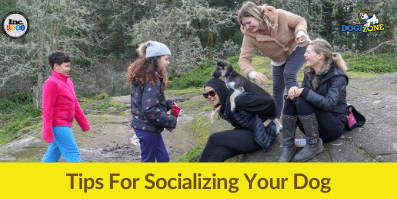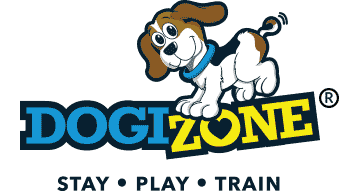Tips For Socializing Your Dog
One of the most important aspects of socializing your dog is to ensure the pet is exposed to many different situations and circumstances as part of routine training. 
Socializing your dog can happen at any time. Still, it is most effective when started early and maintained throughout the life of the dog. Early socialization helps puppies to overcome natural fears and limit aggressive, fearful, or anxious types of behaviors in both new situations as well as in common, everyday types of events and occurrences.
Puppy training classes, also known as puppy obedience or puppy preschool classes, are an excellent socialization tool. However, early socialization before the course can help your pup to be comfortable and confident in the training environment, allowing you both to get the most out of the class.
Puppies go through two critical “fear stages” in their life. One is at about eight to ten weeks of age, with the second occurring somewhere between six and fourteen months. During these times, carefully exposing puppies to new situations that are positive helps the dog to become secure and comfortable in the environment. Puppies who experience fearful episodes at these times, either a single event or multiple events, often develop challenging behaviors such as aggression, heightened flight or fright responses, and difficulties in adjusting to new situations.
Socializing Your Dog With New People
Puppies tend to bond quickly with their primary caregivers and those in the home. These are the people the puppy interacts with on a daily basis, and they are the people that provide food, water, entertainment, and a lot of love.
Exposing a puppy to lots of positive, dog-friendly individuals is important. Talk to people in advance about approaching the puppy calmly and allowing the puppy to make the first step to getting to know the person. Kids should be taught not to run up to or yell at or around the puppy during this stage.
Other Animals
Introducing your vaccinated puppy to other dog-friendly dogs and puppies is another step to prepare for puppy training classes. The dog park is not the ideal spot as there are too many uncontrolled factors, including other dogs and their owners.
Instead, consider setting up puppy play dates in your yard where the environment and the companion dog can be monitored and controlled throughout the interaction.
Puppy-friendly cats are also helpful with socialization. Cats that are not familiar with being around dogs can be very aggressive and should not be used for socialization.
Car Rides
Part of socialization is being comfortable in new situations. Most people will drive to puppy training classes, so having the puppy comfortable with getting in the vehicle helps to alleviate stress and anxiety before the class even starts.
Crate the puppy or use a safety harness in the car. Start by simply placing the puppy in the vehicle and providing lots of praise and a few treats. Get the puppy used to the restraint system you are using in the vehicle, and then start with short drives followed by treats, praise, and time to play.
Finally, get your puppy used to different noises. Low volume on the TV can help your puppy to be comfortable with all types of environmental sounds. Just be sure to keep everything short, positive, and without any stress for the puppy.

